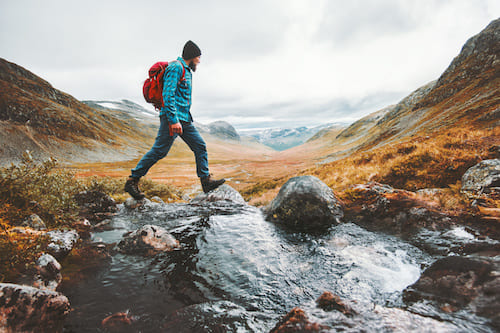December 20, 2019
 I come from a poor family from a third-world country.
I come from a poor family from a third-world country.
All disagreements, problems and struggles always revolved around money. I grew up frustrated, living in a society that didn’t allow me to reach my full potential.
When I moved, and made progress in my studies and career, I didn’t lose the anger. I got angrier. I was envious of people who had it easier in life. No matter how hard I worked and what results I achieved, I never felt I did well enough.
Then, two years ago, I went into a dark period of negative thoughts. I kept my smile on in front of others, but I couldn’t stop crying and sleeping whenever I was alone. My therapist knew it right away: I was diagnosed with major depressive disorder. She put me on medication, but also recommended I do something with my free time. That’s how I started hiking for my mental health.
When I found out I had depression, I freaked out. At first, I was in denial. All signs and symptoms were there, from sadness to delusional thoughts to spending days without eating anything.
Therapy helped.
I believe that most therapists are good, but I was lucky to find a great one. She listened to me, and she kindly suggested that getting outside my comfort zone would help me let go of angry and depressive thoughts. I realized that money, the greatest problem I had throughout life, wasn’t going to prevent me from doing something I liked. So I hit the trails.
This was a slow, progressive process. It was not easy. I pushed myself to get my backpack and cross the doorstep. The trails were local at first. But this spring, I had my first backpacking adventure in Peru and that’s what really got me excited about life — for the first time.
Backpacking is not a cure for depression. When you’re depressed, therapy is necessary. However, the many mental benefits of hiking can put you in a better mood and help with depressive thoughts. My experience is just that, an experience, which came alongside therapy.
Now that I have overcome my darkest stage, I see how hiking prevents me from falling back.
Here are a few ways I’ve benefited from hiking.
Hiking lets you see the bigger picture
What’s the point? That was the question bugging me all the time. What’s the point of this life, and how can I enjoy it?
Hiking helped me see the point. I transformed from a person constantly focused on daily disappointments to someone who sees things with a greater perspective. No matter what happens in our lives, nature is always there. It’s always beautiful. It keeps being. It keeps giving. It gives us purpose.
It gives you time to “process”
The purpose of hiking is not to ignore thoughts and problems. On the contrary, it’s great for processing. I didn’t use hiking as a distraction, but as an opportunity to be with my thoughts.
I bring my journal with me, and I feel that journaling, a method that many therapists recommend for depression management, works much better in nature. I write about my thoughts, but I also write about the good things I see around me.
When I come back from a backpacking trip, I take time to reflect. I have learned to be mindful about my experiences. When I think about them, I realize that my life is not as bad as my mind wants to present it.
Being in nature decreases obsessive thoughts
After I realized hiking was good for me, I read a study about the effects of nature on mental well-being. The researchers found that walking in nature helped people decrease negative, obsessive thoughts, while walking in an urban environment did not.
Although many of us may think research does not necessarily reflect the way we feel when we experience depression, the article really resonated with me. Whenever I started feeling low, I felt the need to get outside.
It’s important to do something that makes you happy
Maybe you don’t feel like hiking. But just try it once. Get out there on the trail. You, your backpack and someone who supports you. If you have a dog, even better! If you don’t like it, it’s okay. You can try something else, like reading a book or talking to a friend you love.
The important thing is to gently push yourself to do something you’d enjoy. You can overcome depression. It’s a long, exhausting journey. We’ve got to fight back.
Robert Everett is a writer at Edu Birdie His experience working as a freelancer has allowed him to start exploring the world. Through his blog posts, Robert shares his experiences with mental health issues and would like to offer a helping hand to those who need it.
We’re always accepting submissions to the NAMI Blog! We feature the latest research, stories of recovery, ways to end stigma and strategies for living well with mental illness. Most importantly: We feature your voices.
LEARN MORENAMI HelpLine is available M-F, 10 a.m. – 10 p.m. ET. Call 800-950-6264,
text “NAMI” to 62640, or email. In a crisis, call or text 988 (24/7).